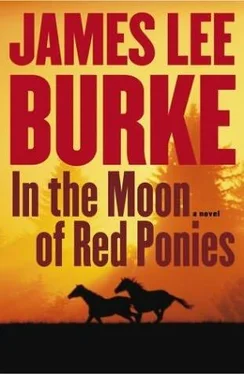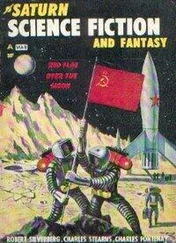James Burke - In the Moon of Red Ponies
Здесь есть возможность читать онлайн «James Burke - In the Moon of Red Ponies» весь текст электронной книги совершенно бесплатно (целиком полную версию без сокращений). В некоторых случаях можно слушать аудио, скачать через торрент в формате fb2 и присутствует краткое содержание. Жанр: Полицейский детектив, на английском языке. Описание произведения, (предисловие) а так же отзывы посетителей доступны на портале библиотеки ЛибКат.
- Название:In the Moon of Red Ponies
- Автор:
- Жанр:
- Год:неизвестен
- ISBN:нет данных
- Рейтинг книги:5 / 5. Голосов: 1
-
Избранное:Добавить в избранное
- Отзывы:
-
Ваша оценка:
- 100
- 1
- 2
- 3
- 4
- 5
In the Moon of Red Ponies: краткое содержание, описание и аннотация
Предлагаем к чтению аннотацию, описание, краткое содержание или предисловие (зависит от того, что написал сам автор книги «In the Moon of Red Ponies»). Если вы не нашли необходимую информацию о книге — напишите в комментариях, мы постараемся отыскать её.
In the Moon of Red Ponies — читать онлайн бесплатно полную книгу (весь текст) целиком
Ниже представлен текст книги, разбитый по страницам. Система сохранения места последней прочитанной страницы, позволяет с удобством читать онлайн бесплатно книгу «In the Moon of Red Ponies», без необходимости каждый раз заново искать на чём Вы остановились. Поставьте закладку, и сможете в любой момент перейти на страницу, на которой закончили чтение.
Интервал:
Закладка:
He pushed the button for the nurse who would come to the room and then tell the U.S. marshal on the door that Johnny needed to be unhooked so he could use the bathroom. The rain clicked on the glass, and he could hear a freight train blowing somewhere west of town, perhaps heading into Alberton Gorge. After the marshal unsnapped the cuff on his wrist, Johnny stood by his bed and gazed out the window at the dark green sogginess of the maples on the street, the cars driving with their lights on in the middle of the day, and the columns of smoke rising from extinguished fires on the mountainsides. All that separated him from the outside world was a pane of glass and a thirty-foot drop onto a spongy square of flooded lawn.
He used the toilet, then waited for the marshal to hook him up again.
“It looks like you’re going to Fort Lewis tomorrow. Sorry to lose you, Johnny. You play a mean game of checkers,” the marshal said.
He was a heavyset, prematurely balding man named Tim, who had a small Irish mouth and big hands, and was evidently addicted to the candy bars he carried in his pockets as a surrogate for the booze he was trying to get rid of at Twelve-Step meetings.
“Who told you that about Fort Lewis?” Johnny asked, lying back on the bed, the handcuff chain pulling tight on his wrist.
“Forget I mentioned it. That’s true, you have the DSC from Operation Desert Storm?”
“Yeah, you want it?”
“Shouldn’t kid like that,” Tim said.
A floral delivery man tapped on the door and Tim let him in. The delivery man started to set a vase of cut flowers on the table by Johnny’s bed. “Let me see that first,” Tim said.
Tim peeled back the decorative foil wrapped around the vase, shifted the flower stems around in the water, and examined the greeting card inside the small envelope attached with a paper clip to the foil. Then he set the vase down on the table. “Looks like somebody sent you a nice bouquet. Can I ask you something?” he said.
“Sure,” Johnny said.
“How’d you get messed up like this?”
“It was easy. I was me,” Johnny said.
“You sound like you might be a Twelve-Step guy yourself.”
“I’m not,” Johnny replied.
As the marshal and the nurse left the room, Johnny glanced through the opened door and saw a group of painters pass by, carrying buckets, tarps, ladders, and brushes, all of them dressed in paint-flecked caps and coveralls. The last man in the group was an Indian from the res. His eyes, as unreadable as obsidian, swept across Johnny, then the door closed.
Johnny removed the card from the envelope on the flower vase and opened it. It read:
They still won’t let me visit you, but look across the street at noon and you’ll see your gal with the 8:30 blues. We’re going to beat this, baby.
Love, A.
Johnny stared at the paper clip on the envelope, then looked at the glass in the window that separated him from the outside world. He looked at the glass a long time, then gave up whatever thoughts were on his mind and ate the breakfast an orderly brought in on a tray. At eleven-thirty, just before he was scheduled to be cuffed to a wheelchair and rolled down the corridor for X-rays, Johnny slipped the paper clip into his mouth between his gum and cheek.
The rain had turned to hail, and it bounced on the windowsill as brightly as mothballs against the grayness of the day. When Johnny closed his eyes and listened to the hail and the roll of thunder in the hills, he imagined a vast landscape where the mesas rose into steel-colored stormheads forked with lightning while down below the hooves of red ponies shook the earth. At this moment, for no reason that made logical sense, he knew his dreams were real and not fantasies and that all the gifts of creation still awaited him, were still his, as tangible as a woman’s smile on the far side of a street on a rainy day.
That morning I left the office and went home, unable to work, concentrate, or think on any subject except the telephone threat that had been made against Temple and the child she was carrying. I had now talked to the sheriff’s office, Fay Harback, and the FBI agent Francis Broussard and had gotten nowhere. Lucas had been set up on a bogus marijuana bust and suspended from the university, and Temple had almost drowned in the Blackfoot River after the brake-fluid line on our truck had been cut. No one was in custody for any of the damage done to my family, nor had anyone even been questioned. My own relationship with every law agency in the area had become that of gadfly and public nuisance.
Most television cop dramas make use of the following storyline: A likable individual is raped or assaulted, or a hardworking family loses one of its members to a serial killer, or a blue-collar stiff with a juvenile felony on his record gets jammed on a bad beef and is about to be sent to the pen. What happens? A half-dozen uniforms and five detectives with shields hanging from their necks show up at the crime scene and invest the entirety of their lives in seeing justice done. Every law officer in the script, male and female, seems to have an IQ of 180 and the altruism of St. Francis of Assisi. They verbally joust with the rich and powerful, walk into corporate board meetings where they hook up CEOs, and are immune to the invective flung at them by an unappreciative citizenry.
The federal agents who wander into the script are even more impressive. They have tanned skin, little-boy haircuts, and the anatomies of California surfers. Their psychoanalytical knowledge of the criminal mind is stunning. Without hesitation, they conclude for the viewer that serial rapists possess violent tendencies toward women and people who plant bombs on airplanes are antisocial.
But my thoughts on the subject are cheap in design and substance. It’s easy to be facile about law enforcement. The truth is the good guys are understaffed, overworked, underfunded, and out-gunned. Most of the time the bad guys win, or if they do take a fall, it’s because a wrecking ball swings into their lives for reasons that have nothing to do with jurisprudence. If you have ever been a victim of violent crime, or if you have been threatened by deviates or sadists-and by the latter I mean wakened by anonymous phone calls in the middle of the night, surveilled by people you’ve never seen before, forced to take public transportation because you’re afraid to start your car in the morning-then you know that what I’m about to say is an absolute fact: You’re on your own.
Law enforcement agencies don’t prevent crimes. With good luck, they solve a few of them. In the meantime, if violent and dangerous people intend to do you injury, your own thoughts become your worst enemies. The morning might start with sunshine and birdsong, but by noon it’s usually filled with gargoyles.
I walked around the house aimlessly, trying to chase down each of my thoughts and hold it in a bright place in the center of my mind, face it down fair and square. But it was to no avail. Thunder ripped across the sky and rain pounded on the roof and swept in sheets across the hillside. Through the kitchen window I thought I saw L. Q. Navarro standing among the fir trees, wearing his pin-striped suit and ash-colored Stetson, his face lit briefly by a flicker of lightning.
Take this guy Mabus off at the neck. Smoke him and put a throw-down on the body and buy your wife a trip to Hawaii, he said.
I wish I could, L.Q.
Don’t think about it, just do it. Everybody dies. You want this guy to kill your wife or unborn child or Lucas? Take care of your own and screw the rest of it.
That easy, huh?
There’s nothing wrong with this guy Mabus a two-hundred-and-thirty-grain brass-jacketed hollow-point wouldn’t cure.
But I did not listen to L.Q.’s words. Instead, I found Karsten Mabus’s business card, the one he had given me with his home telephone number written on the back. I hesitated only a moment, then punched the number into the phone, thereby beginning the commission of the most cowardly act of my life.
Читать дальшеИнтервал:
Закладка:
Похожие книги на «In the Moon of Red Ponies»
Представляем Вашему вниманию похожие книги на «In the Moon of Red Ponies» списком для выбора. Мы отобрали схожую по названию и смыслу литературу в надежде предоставить читателям больше вариантов отыскать новые, интересные, ещё непрочитанные произведения.
Обсуждение, отзывы о книге «In the Moon of Red Ponies» и просто собственные мнения читателей. Оставьте ваши комментарии, напишите, что Вы думаете о произведении, его смысле или главных героях. Укажите что конкретно понравилось, а что нет, и почему Вы так считаете.












